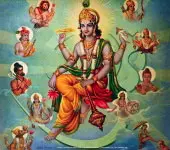Comments
Read more comments
Knowledge Bank
What are some ways to worship my Ishta Devata?
There are many different ways to worship your Ishta Devata. Some common ways include: 1. Chanting mantras Offering prayers. 2. Making offerings of food and flowers. 3. Visiting temples. 4. Performing pujas. 5. Meditating upon the form. 6. Listening to and propagating the glories.
What is the story of Nara Narayana?
Nara and Narayana were performing tapas. Indra sent Kamadeva and several apsaras to distract them. Nara-Narayana demonstrated their spiritual power and self-control to Indra by producing apsaras such as Urvashi from their own thighs.
Quiz
Transcript
(Click here to read more)
It is customary in the Hindu tradition to perform prayaschittas and pariharas when facing problems in life. For example, if someone is having health issues, then Mrityunjaya Homa is performed. How does this work? What is the principle behind this? The answer is in the Taittiriya Aranyakam, 2nd Prapathaka of Yajurveda. अग्निं वै जातं पाप्मा जग्राह तं देवा आहुतीभिः पाप्मानमपाघ्नन्नाहुतीनां यज्ञेन यज्ञस्य दक्....
Transcript
(Click here)
It is customary in the Hindu tradition to perform prayaschittas and pariharas when facing problems in life.
For example, if someone is having health issues, then Mrityunjaya Homa is performed.
How does this work?
What is the principle behind this?
The answer is in the Taittiriya Aranyakam, 2nd Prapathaka of Yajurveda.
अग्निं वै जातं पाप्मा जग्राह तं देवा आहुतीभिः पाप्मानमपाघ्नन्नाहुतीनां यज्ञेन यज्ञस्य दक्षिणाभिर्दक्षिणानां ब्राह्मणेन ब्राह्मणस्य छन्दोभिश्छन्दसाꣳ स्वाध्यायेनापहतपाप्मा
It is a very clearly established principle that it is our own misdeeds or sin from the past that come to trouble us in the form of diseases, losses, quarrels, dangers, threats, poverty etc.
In the Vedic language, sin is called Papma.
If a trouble is due to a sin, when does it end?
Either when it is exhausted through suffering or by using some other means which can remove that sin.
If a clothe gets dirty or soiled what do we do?
We wash it with water.
What happens when you wash it.
The dirt from the clothe gets transferred to water.
The clothe becomes clean but the water becomes unclean.
Water absorbed the dirt that was there in the clothe.
Dirt went from one place to another.
So what if we had something which like water would absorb sin from someone?
It would be so good.
So Devas invented Agni.
Agni like a sponge would absorb sin wherever he is.
Wherever you ignite the divine Agni, not just ordinary fire, it has to be ignited in the prescribed way, Agni would absorb trouble producing sins from around him.
That's why we light lamps at home in the morning and evening.
Not for light.
Even when you have all those electric lights on, you still light an oil lamp or ghee lamp in front of God, right?
In traditional homes, a lamp is lit and kept near the entrance itself.
Any papma or negativity trying to enter the house is absorbed by divine Agni at the entrance itself.
This an electric light will not be able to do.
This is what Veda says अग्निं वै जातं पाप्मा जग्राह
As soon as Agni is born, papma takes hold of it.
Meaning sin present at the place where Agni is ignited, gets transferred into that Agni.
But that is not good enough.
It has to go away.
When you light a lamp at home, there we are talking about small day-to-day sins that keep on happening.
But a major problem or disease, then lighting a lamp may not be sufficient.
Then a homa is performed.
Agni is ignited in a homa kunda by purohitas in the proper Vedic way.
But there also, the situation is the same.
The sins are absorbed by that Agni.
Like the water which has washed dirty clothes, that Agni has become impure.
So Devas invented something for this.
The purohitas should put holy materials into that Agni by chanting appropriate mantras.
This is the process of homa or yajna.
देवा आहुतीभिः पाप्मानमपाघ्नन्नाहुतीनां यज्ञेन
The sins get transferred to that yajna or the entire process.
Instead of just Agni, now the sins have become part of the entire procedure of yajna.
Even that is not sufficient.
यज्ञस्य दक्षिणाभिर्दक्षिणानां ब्राह्मणेन
When you give dakshina to the purohitas, the sins present in the yajna get transferred to the purohitas.
And they take them home.
See it works with the precision and efficiency of a supply chain.
Then what.
Won't the purohitas get affected by the sins?
Of course, they will, unless
ब्राह्मणस्य छन्दोभिश्छन्दसाꣳ स्वाध्यायेनापहतपाप्मा
The sins that they take away from the venue of the prayachitta, they have get rid of them, burn them away through swadhyaya.
Through their own daily chanting and other anushtanas - swadhyayena.
Swadhyaya is the final end point for those sins.
The purohitas bring the sins back home and destroy them through their own swadhyaya.
What they chant at the venue of the prayschitta, doesn't destroy the sins.
That would only purify the Agni.
But when the receive dakshina, those sins are transferred to them, they take them home and then destroy them through swadhyaya or daily chanting, etc, through the power or mantras.
But is that the final thing?
Yes, Veda says - स्वाध्यायेनापहतपाप्मा
Swadhyaya destroys sins.
Until swadhyaya takes place, it is only transfer from one hand to the next.
It is swadhyaya of the purohita which ultimately destroys papma.
Recommended for you
Ashwini Nakshatra Marriage Compatibility

Learn which Nakshatra are compatible with Ashwini for marriage. Both South Indian and North Indian systems.....
Click here to know more..Do you know that charity itself can become a problem?

Sarvarti Nashana Shiva Stotram

mri'tyunjayaaya girishaaya sushankaraaya sarveshvaraaya shashishekharamand'itaaya. maaheshvaraaya mahitaaya mahaanat'aaya sarvaatinaashanaparaaya nama....
Click here to know more..
